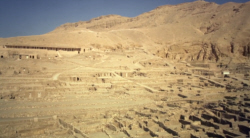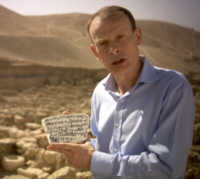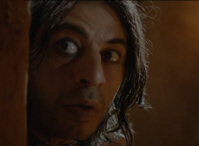Egypt - Messaging
Early Writing
Andrew Marr’s History of the World - Age of Survival

Egypt, 3,200 years ago. The Nile is the longest river in the world. It flows from south to north, but the prevailing winds go the other way, making it a wonderful two-way transport system and a lush green corridor. So it’s not so surprising that the world’s first great civilisation started here, with its temples, writing, priests, it’s awesome rulers.
The Pharaohs thought that their stony, river civilisation would last for eternity, and, of course, all of this is only possible because of the huge numbers of people planting, and cursing, and lifting and cutting - all the workers on whose backs these great edifices were raised and you never hear about them. You never know what THEY thought of it all.
Except, but sometimes you do hear. Thanks to one remarkable invention, we know exactly what life was like for ordinary Egyptians.

This was once the town of Set Ma’at, “The Place of Truth”. Stonemasons and carpenters who built the Pharaohs’tombs in the nearby Valley of the Kings lived here.
22,000 years after we splashed our handprints onto the walls of caves, our enthusiasm for leaving our marks on the world had reached a new level.
Writing had developed in Egypt around 5,000 years ago, and at first it would have been the preserve of specialist scribes but the people of Set Ma’at are among the first working people in the world to learn how to write.

The ordinary villagers sent letters and messages, rather as we fire off texts and e-mails today, but they wrote them down on little pieces of limestone or on broken pieces of pottery. They’re called ostraca. And they were discovered in their thousands where they’d just been chucked away, so that we can eavesdrop on village life from more than 3,000 years ago.
One of the voices we hear is from an old woman called Naunakthe. As we hear her speak, a civilisation that seemed distant and alien suddenly become surprisingly familiar.
‘I have raised eight children and brought them up well, given them everything they need. Now look, I have become old and they don’t care for me. The ones who put their hands in mine and looked after me, I will leave him my property. But as for the others, they will get nothing.’
The records are packed with all human life - children’s home work, laundry lists, a remedy for piles - green beans, salt, goose fat and honey on the backside for four days.

Oh, yes, and the story of Paneb, a married man with a son and two daughters. A builder with a sideline - because Paneb was also a tomb Raider.
His story is told in the court records of a scandalous trial. Paneb was the talk of the village. He was accused of plundering the tomb of the Pharaoh and stealing burial goods. The judge also charged him with drunk and disorderly behaviour… And with a violent assault against his stepfather.
Bad enough - Paneb, thief and hooligan - but there was more. He’d slept with the wife of his fellow builder Kenna, and, no, it didn’t stop there. To make matters worse, Paneb then went on to sleep with Kenna’s daughter.
It’s beginning to sound like an early draft of East Enders. An outbreak of wild Nile naughtiness. But what’s really interesting is the court itself. Each Egyptian community had one. What’s happening here is another major development in early human history. They are trying to impose order on society. In villages and towns, the instinct for fairness is producing law. This is good news for human civilisation, although, on the whole, pretty bad news for Paneb. Tough on crime, tough on the causes of crime. Life wasn’t easy for ordinary Egyptians, but order was infinitely better than disorder.
We all remember the pyramids and Pharaohs, but advances which were, in the long term, just as significant were being made behind humbler walls.
But it wasn’t just ancient Egypt. All around the Mediterranean, you start to see people learning to read and write. They trade little luxuries. They eat better food. They consume spices and herbs. They drink beer and they drank wine. And things are just going to get better and better. Or maybe not.
Writing helped speed up the spread of ideas. Trade accelerated the growth of towns and cities, and civilisation was spreading. But the battle with nature never stopped.
